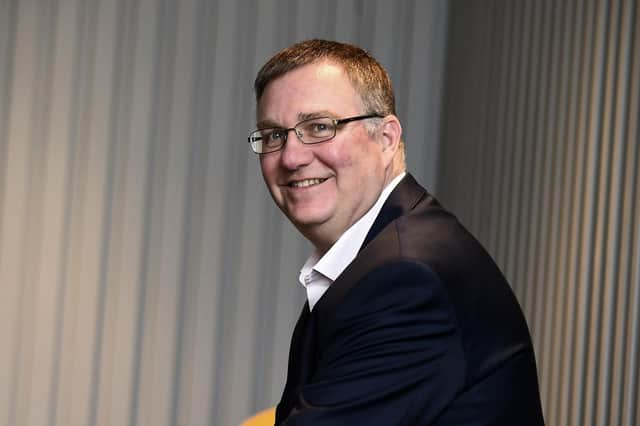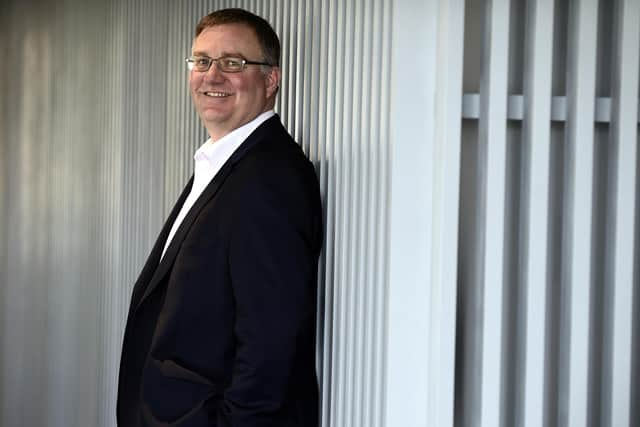The Big Interview: Alasdair Cummings, managing partner of law firm Lindsays


Alasdair Cummings became managing partner of Lindsays in 2011, and is credited with being actively involved in the firm’s growth, and strengthening and developing the key sector teams.
He originally trained with the firm, then worked for several years in a large London law firm before returning to help develop Lindsays’ commercial practice.
Advertisement
Hide AdAdvertisement
Hide AdThe firm originated in 1815 when cousins Frederick Fothringham and John Lindsay, two 22-year-olds from Forfarshire, set up a law firm at 80 George Street in Edinburgh. It now has 39 partners and serves clients as far afield as Canada, China, Australia and Ukraine.


You start a new three-year term as managing partner this month – what do you hope to achieve and where do you see challenges?
Well, as you can imagine my top priority at the moment is to steer the firm through the immediate impact of coronavirus. So I’m working with my colleagues on the management board, which is our chief operating officer Ian Beattie, Susan Law and Andrew Diamond, to ensure that we come out of the other side in as strong a position as we possibly can. We have more than 250 people relying on Lindsays for their livelihoods, so this is our absolute current priority.
Then after that, it’s about continuing what we’ve been doing; looking for opportunities, expanding, bringing in new people. We have a full range of services, in Edinburgh, Glasgow and Dundee, able to cater for people, business and the third sector, and we’re growing in every area. And of course we’re an independent firm, and we’re going to stay that way.
What attracted you to the legal profession?
I really enjoyed English and history at school but I didn’t really know what to do, to be honest. I got some good careers guidance at school. They suggested a law degree would play to my strengths. Nobody in the family had ever been in the law, so I took the plunge, went to study at the University of Edinburgh and then came to Lindsays for my traineeship.
You trained with Lindsays but then worked for several years in a large London law firm, before returning – how did this career path come about?
In those days, making the switch to London was a well-trodden path in law, finance and accountancy. I finished my traineeship here in 1988 and having been to school and university in Edinburgh I wanted to spread my wings.
I secured a newly qualified position with Wilde Sapte, which after a series of mergers is now part of Dentons. Even then it was a big firm – I went from a nine-partner organisation in Atholl Crescent to a 50-partner firm close to St Paul’s Cathedral with a roof terrace and views over the Thames. It was a big culture change for me – actually I still remember the fun of showing my parents around the office.
Advertisement
Hide AdAdvertisement
Hide AdI loved my time in London and made a lot of friends, many of whom became good business associates and have been instructing me and Lindsays ever since. But I was always going to come back to Edinburgh.
Amid a Scottish legal sector that has seen great consolidation, last year you announced your fifth takeover in seven years – joining forces with Hadden Rankin. Are any further such deals on the cards?
Oh, I should think so, yes. I fully expect there will be more opportunities coming our way.
There are various factors that can contribute to the decision that the type of firms who’ve merged with us make. Lease expiry, IT software replacement, regulatory compliance, difficulty in recruiting and retaining staff and so on, and the mergers have been great for us because we’ve been able to bring in some very talented people to the business.
So there’s no doubt about it, we’re keen to do more if the right opportunity presents. It’s working well for us, and crucially it’s also working really well for the firms we merge with, their people and their clients.
You have been involved in several major transactions – are there any you would single out as being particularly pivotal either for you or Lindsays?
I think the story for me is of a growth journey rather than a single transaction. My brief on returning to Lindsays in 1993 was to help develop the commercial side of the business as that was an area Lindsays was not traditionally strong in and to seek to complement the strong property and private client areas of the firm.
The connections I’d made in London were really important, and I was instructed by quite a few London firms on various banking and asset finance transactions when I came back. That helped kick-start things for me. It has all been about relationships, really. We are now very much a full-service firm and we continue to enjoy working with London firms as part of what we do.
Advertisement
Hide AdAdvertisement
Hide AdSo rather than singling out transactions, I’d single out relationships. People like Stephen Hay, who was at Lindsays when I was a trainee, who I became really good pals with, who then started a tax advisory business and who’s been working in collaboration with Lindsays now for 25 years.
The Competition and Markets Authority recently put forward recommendations for the Scottish legal services sector, saying it “may not currently be delivering good outcomes for people”. What is your view on the report?
I think all of us in the sector need to look at it carefully. Of course, as soon as it came out, we’ve all been plunged straight into the coronavirus issue so I think it might be a little further down the line that the legal sector turns its attention to it.
But let’s remember too that we have a very competitive sector, and we see a lot of lawyers certainly here, and of course at other firms too, who work hard and do their best for their clients.
What steps has Lindsays been taking because of Covid-19?
Well, first and foremost we now have more than 170 people working from home at 100 per cent capacity in a very short space of time. The board is meeting daily by video conference; teams across the firm are meeting daily by video conference and doing the same with clients.
The key to managing this sort of mega-event is good communication; in the management team, across the firm, and with clients. So we’ve been able to continue to deliver for all our clients, with the help, it should be said, of other firms on the other side of transactions, and the Law Society of Scotland, working constructively to make sure clients get what they need.
As you’d expect, this has been particularly important in our residential property team for house purchases, and in our private client division dealing with wills and powers of attorney. Our employment team is working flat out at present advising clients on the new furlough arrangements and suchlike.
What is your view on the growing role technology can play in the legal sector?
Advertisement
Hide AdAdvertisement
Hide AdWe’ve always been a nimble firm. We’re big and established enough to have a real footprint in the sector, but small enough that we can innovate quickly and efficiently, to maximum effect.
So we’ve been using all the technology that the country has grown suddenly reliant on – Zoom, WhatsApp, Microsoft Teams – and we’ve been able to substantially increase that usage fairly easily. And it’s been good – video is so much more powerful than audio when it comes to teamwork and productivity, and actually we’ve all found it to be rewarding.
It gives us a lot to think about in the longer term, once we’re through the acute coronavirus issue. How much more efficiency and productivity can we extract from remote working? Where can we utilise video in a way that might actually revolutionise some of our business areas? There’s a lot to think about.
Looking to the end of your current three-year term, how would you like Lindsays to look at that point?
Well, in some ways I’d like it to look fairly similar to how it does just now. It’ll be an independent Scottish firm, it’ll be in Edinburgh, Glasgow and Dundee, and it’ll be offering a full range of service to people and businesses.
But I’d like it to be larger. I’m alive to opportunities, to bringing in smaller firms and their people, to continuing to grow without losing our ethos. And I want it to be a firm where people want to work.
I want this firm to thrive. If you cut me in half it says Lindsays. It’s been nearly 35 years since I first started here. My wife Kirsty was a trainee here at the same time. So Lindsays isn’t just work for me. It’s a family. We’ve got each other’s backs.
A message from the Editor:
Thank you for reading this story on our website. While I have your attention, I also have an important request to make of you.With the coronavirus lockdown having a major impact on many of our advertisers - and consequently the revenue we receive - we are more reliant than ever on you taking out a digital subscription.Subscribe to scotsman.com and enjoy unlimited access to Scottish news and information online and on our app. With a digital subscription, you can read more than five articles, see fewer ads, enjoy faster load times, and get access to exclusive newsletters and content. Visit www.scotsman.com/subscriptions now to sign up.
Advertisement
Hide AdAdvertisement
Hide AdOur journalism costs money and we rely on advertising, print and digital revenues to help to support them. By supporting us, we are able to support you in providing trusted, fact-checked content for this website.
Frank O'Donnell
Editorial Director
